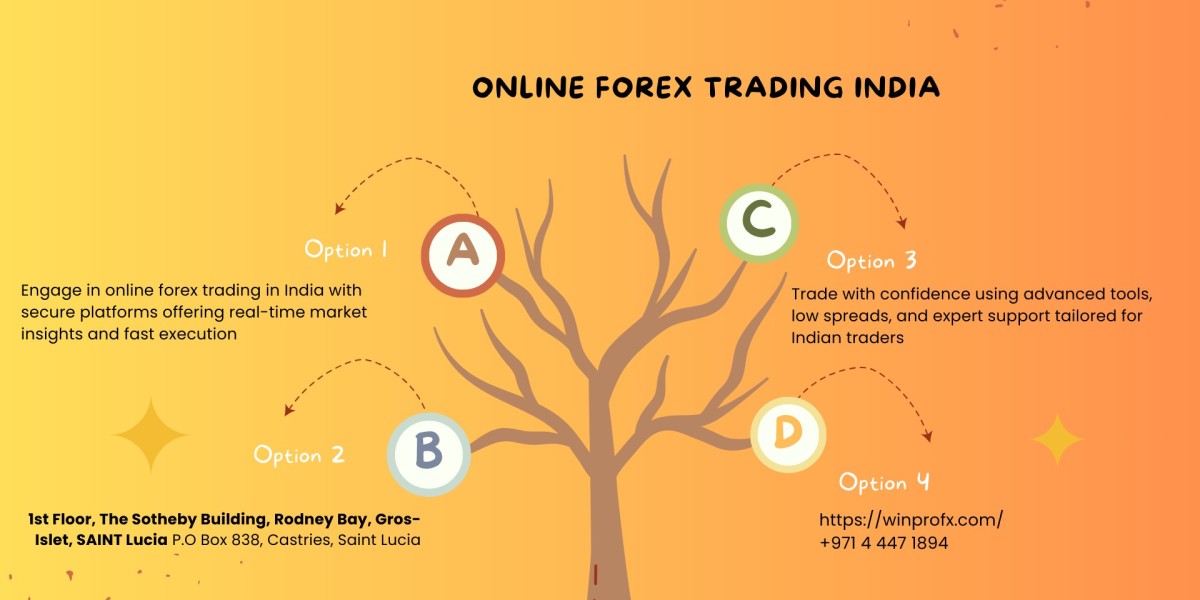Online Forex trading refers to buying and selling currency pairs through digital platforms that facilitate currency trading. In India, the Securities and Exchange Board of India (SEBI) regulates Forex trading, and traders typically trade currency derivatives (such as currency futures and options) on regulated exchanges like NSE (National Stock Exchange), BSE (Bombay Stock Exchange), and MCX-SX (Multi Commodity Exchange of India).
Due to SEBI's regulations, Indian retail traders can only trade in currency futures and options and not in the spot market (i.e., the actual exchange of currencies). This means that you can speculate on the price movements of major currency pairs, but you won't be physically exchanging the currencies.
How Does Forex Trading Work in India?
Forex trading in India primarily involves currency derivatives, where traders agree to buy or sell currency futures contracts or options contracts at a future date, based on the price of a currency pair at that time. For example, you could trade the USD/INR (US Dollar to Indian Rupee) pair, speculating whether the US Dollar will strengthen or weaken against the Indian Rupee.
Steps to Start Online Forex Trading in India:
1. Choose a SEBI-Regulated Broker
To trade Forex in India, you need to choose a SEBI-regulated Forex broker that offers access to currency futures or options. Some popular brokers include Zerodha, Upstox, Angel One, ICICI Direct, and HDFC Securities. These brokers offer trading platforms where you can access the currency derivatives market.
2. Open a Trading Account
To begin, you need to open a trading account with your chosen broker. This typically involves providing:
- Proof of identity (Aadhaar card, PAN card, etc.)
- Address proof (utility bill, bank statement, etc.)
- Bank details (for fund transfers)
3. Fund Your Trading Account
After opening your trading account, you will need to fund it. This can be done through bank transfers or using net banking options provided by your broker. The amount you deposit into your trading account is used to buy currency futures or options contracts.
4. Select a Trading Platform
Once your account is funded, you will need to download or access the broker’s trading platform. Most brokers offer desktop platforms, mobile apps, and web-based platforms. Some of the most popular platforms include:
- Zerodha Kite
- Upstox Pro
- ICICI Direct trading platform
- Angel One (Angel Broking)
These platforms offer features like advanced charting, technical analysis tools, and real-time price feeds.
5. Start Trading
With your platform set up, you can start trading by selecting a currency pair like USD/INR, EUR/INR, GBP/INR, or other major pairs. Your goal is to speculate on whether the price of the currency will rise or fall in the future.
- Buy (Long) if you expect the base currency (e.g., USD) to rise in value relative to the quote currency (e.g., INR).
- Sell (Short) if you expect the base currency to fall.
6. Risk Management and Leverage
- Forex trading typically involves high leverage (up to 1:50 in India as per SEBI rules), which allows you to control a larger position with a smaller margin. However, leverage also increases risk.
- Use stop-loss orders and take-profit orders to help limit potential losses and secure profits.
7. Monitor and Close Your Positions
You can monitor your positions through the trading platform, which will display real-time price movements. Once your target profit or loss level is reached, you can choose to close the position.
Best Forex Trading Platforms in India
Here are some of the best Forex trading platforms available in India that offer currency derivatives trading:
1. Zerodha Kite
- Platform Type: Web-based, Desktop, and Mobile App.
- Features:
- Advanced charting and technical analysis tools.
- Fast execution and real-time market data.
- Low brokerage fees and transparent pricing.
- Why it’s great: Zerodha is a discount broker that offers an intuitive platform with all the necessary tools for beginner and intermediate traders. It’s known for its low costs and excellent customer support.
2. Upstox Pro
- Platform Type: Web-based, Desktop, and Mobile App.
- Features:
- Real-time market data and advanced charting tools.
- Customizable interface and fast order execution.
- Low brokerage fees.
- Why it’s great: Upstox Pro is a feature-rich platform offering great tools for currency trading at affordable rates. It’s known for its speed and low-cost structure, ideal for active traders.
3. Angel One (Angel Broking)
- Platform Type: Web-based, Desktop, and Mobile App.
- Features:
- Comprehensive research and market analysis.
- Customizable charts and real-time data feeds.
- Strong customer support.
- Why it’s great: Angel One offers full-service trading with research and advisory services. It’s perfect for traders who need more market insights and personalized support.
4. ICICI Direct
- Platform Type: Web-based, Desktop, and Mobile App.
- Features:
- Comprehensive research and analysis tools.
- Advanced charting and real-time price tracking.
- Premium services for serious traders.
- Why it’s great: ICICI Direct offers robust research and educational tools, making it ideal for traders who need research-backed trading decisions and are willing to pay a bit more for premium services.
5. HDFC Securities
- Platform Type: Web-based and Mobile App.
- Features:
- Advanced charting tools and real-time market data.
- Comprehensive research and insights.
- Why it’s great: HDFC Securities offers a premium trading experience with access to excellent research and a trusted platform.
Top Forex Currency Pairs Traded in India
Here are some of the popular currency pairs traded in the Indian Forex market:
- USD/INR (US Dollar to Indian Rupee)
- EUR/INR (Euro to Indian Rupee)
- GBP/INR (British Pound to Indian Rupee)
- JPY/INR (Japanese Yen to Indian Rupee)
- AUD/INR (Australian Dollar to Indian Rupee)
- CAD/INR (Canadian Dollar to Indian Rupee)
Regulatory Considerations for Forex Trading in India
- SEBI regulates Forex trading in India, and currency futures are traded on recognized exchanges like NSE, BSE, and MCX-SX.
- Leverage is capped at 1:50 for retail traders in India.
- Trading in the spot Forex market (buying and selling physical currencies) is not allowed for Indian residents. Forex trading in India is strictly for currency futures and options.
- You must use a SEBI-registered broker to ensure compliance with the Indian regulatory framework.
Advantages of Online Forex Trading in India
- Accessibility: You can trade from anywhere using online trading platforms.
- Low Cost: Discount brokers like Zerodha, Upstox, and Fyers offer low brokerage fees for retail traders.
- Leverage: Indian brokers provide leverage up to 1:50 for currency futures trading.
- Educational Resources: Many brokers offer educational content to help beginners learn Forex trading.
- Diverse Pairs: You can trade multiple currency pairs, including major pairs like USD/INR, EUR/INR, and GBP/INR.
Risks of Forex Trading
- Market Volatility: Currency markets can be highly volatile, and leverage increases the risk.
- Leverage Risk: While leverage allows for larger positions with smaller capital, it can also amplify losses.
- Regulatory Changes: Forex trading is highly regulated in India, and regulatory changes can impact trading conditions.
- Currency Pair Fluctuations: Currency pairs can experience large fluctuations based on global economic and geopolitical factors.
Conclusion
Online Forex trading in India offers great potential for those interested in currency derivatives, but it’s important to understand the regulations, choose a SEBI-regulated broker, and use proper risk management techniques. Brokers like Zerodha, Upstox, ICICI Direct, and HDFC Securities offer platforms with advanced tools and low-cost trading, making them suitable for both beginners and experienced traders.









